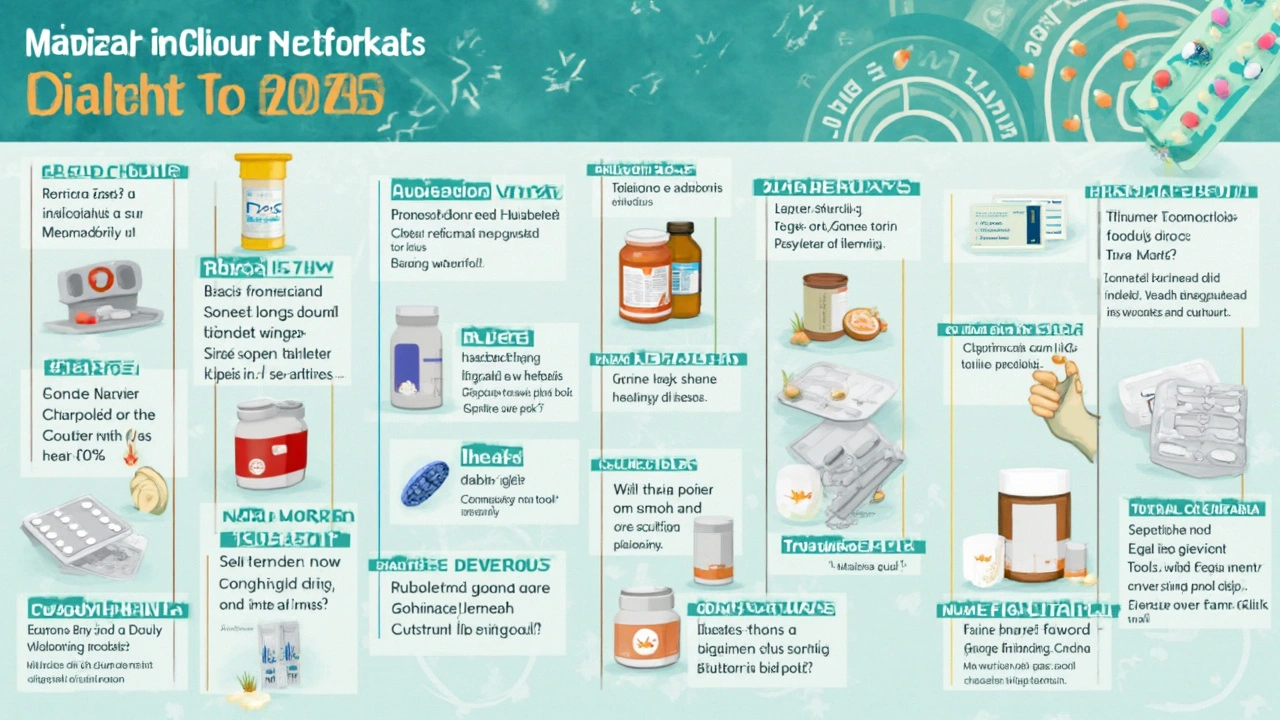
Navigating the world of diabetes management in 2025 is akin to traversing a bustling marketplace—so many choices, each promising to be better than the last. Metformin has long sat at the helm of treatment options, revered for its effectiveness and simplicity. But what if you’re on the lookout for something different, something that aligns more closely with your lifestyle or health goals? Fortunately, innovation and nature provide options aplenty, and this article ventures into that very territory.
Whether your interests lie in natural supplements, lifestyle changes, or cutting-edge formulations, there's a vast array of alternatives ready to step into the spotlight. Of course, the decision of which path to take is a deeply personal one, given unique health profiles and lifestyle needs. Let's dive into these ten Metformin alternatives, uncovering the pros and cons of each, to equip you with the knowledge needed for an empowered choice.
When it comes to stepping into the expansive shoes of Metformin in 2025, few contenders shine quite like Berberine. Extracted from a variety of plants such as Berberis, this compound has been making waves for its potent blood sugar-lowering effects. Considered by many to be a natural alternative to conventional diabetes medications, Berberine's rise is backed by a growing body of research.
Though Metformin has a long-standing reputation in the diabetes management arena, Berberine emerges as a strong competitor, especially for those seeking natural remedies. While Metformin typically requires a doctor's prescription, the allure of over-the-counter accessibility makes Berberine an attractive option for many. Notwithstanding some side effects, Berberine's safety profile is commendable, and its advantages extend beyond mere glycemic control.
A recent meta-analysis involving 27 trials highlighted Berberine's efficacy in reducing HbA1c levels comparably to Metformin, marking it as a substantial player in the field of blood sugar control. However, careful consideration is warranted, especially regarding drug interactions and potential **digestive issues**.
| Feature | Berberine | Metformin |
|---|---|---|
| Prescription Required | No | Yes |
| Origin | Natural | Synthetic |
| Potential Side Effects | Gastrointestinal issues | Lactic acidosis (rare) |
In conclusion, Berberine stands out as a promising option for those seeking alternatives to traditional medications. Its natural origins and broad-spectrum health benefits make it a noteworthy consideration in personalized diabetes management plans.
Among the many alternatives to Metformin that have gained traction recently is Glucocil, a dietary supplement that aims to support blood sugar control. Unlike traditional medication, Glucocil capitalizes on a blend of natural ingredients that collectively target multiple aspects of blood sugar regulation. For those seeking an approach that veers away from pharmaceuticals, this promising supplement is an intriguing option.
For those considering Glucocil, it is advisable to monitor blood sugar levels regularly to assess its impact and consult with healthcare providers to ensure it aligns with comprehensive diabetic care plans. While clinical data remain limited compared to pharmaceuticals, user testimonials often highlight positive experiences, suggesting that Glucocil's role in diabetes management is one of growing potential interest.
Rich in flavor and bursting with historical significance, Cinnamon Extract finds its roots in ancient medicinal practices. Beyond its signature aroma and taste, cinnamon offers potential health benefits, particularly for those managing diabetes. It has weaved its way into health regimes as a natural, flavorful option to control blood sugar levels.
Cinnamon contains bioactive compounds such as cinnamaldehyde, which are credited with mimicking insulin’s action and thus improving glucose uptake in cells. Studies have indicated that when consumed in extract form, cinnamon can reduce fasting blood glucose levels, invariably providing hope to those seeking natural management strategies for diabetes.
For those considering adding cinnamon extract to their diabetes management toolkit, it's crucial to discuss with a healthcare provider first. This ensures it aligns well with any existing treatment plans or medications. The evidence around cinnamon is promising but, like any natural remedy, it works best in synergy with a well-rounded health strategy.
Bitter Melon, often a staple in tropical and subtropical regions, is making waves as a natural alternative to Metformin in 2025. Traditionally used in various cuisines, its medicinal properties have been harnessed by cultures across the globe for centuries. This peculiar fruit, also known as 'Momordica charantia,' is recognized for its potential in blood sugar regulation, making it a suitable candidate in our quest for effective diabetes management solutions.
Bitter Melon is believed to contain bioactive compounds that mimic insulin, enhancing glucose uptake in cells. Studies have suggested that consuming Bitter Melon can reduce blood glucose levels, a boon for those managing diabetes. Curious yet? Let's slice deeper into the unique pros and cons of this plant powerhouse.
So, where does that leave us? Bitter Melon is undoubtedly an intriguing option for those seeking a natural route to manage diabetes. However, like each promising remedy, it comes with its set of caveats. Informed by ongoing research and personal tastes, one’s decision to adopt Bitter Melon into their regimen should be thoughtfully considered. It's a reminder that the road to health is often as bitter as it is sweet.
Embracing a regular exercise regimen is arguably one of the most universally beneficial approaches to managing diabetes, rivaling even the best of medications. Exercise not only helps in lowering blood sugar levels but also improves insulin sensitivity, which can reduce the need for medications such as Metformin.
For those managing diabetes, an ideal exercise plan balances aerobic activities with strength training and flexibility exercises. Here's how you can structure your routine:
The key to sticking with any exercise regimen is choosing activities you enjoy. Whether it's a dance class, hiking, or team sports, enjoyment leads to consistency, which is critical for sustainable results.
| Exercise Type | Recommended Frequency | Benefits |
|---|---|---|
| Aerobic | 150 minutes/week | Improves cardiovascular health and insulin sensitivity |
| Strength Training | 2 times/week | Increases muscle mass, aids weight management |
| Flexibility & Balance | 2-3 times/week | Enhances flexibility, reduces risk of falls |
Ultimately, adopting an exercise regimen is a powerful step towards better diabetes management. While every journey is individual, these guidelines provide a solid foundation upon which to build a healthier, more active lifestyle that complements diabetes care strategies.

In the landscape of diabetes management, dietary interventions like the low-carbohydrate diet have gained considerable attention as potential alternatives to Metformin. This approach focuses on reducing carbohydrates, which are primarily responsible for raising blood sugar levels, and is instead rich in proteins and healthy fats. The idea is simple enough, yet the effects can be profoundly transformative for blood sugar control.
Embracing a low-carbohydrate diet involves significant changes in one's eating habits, which may come with both challenges and rewards. As with any dietary change, consulting with a healthcare provider or a dietitian can provide personalized guidance and ensure nutritional needs are met, making it a viable and safe alternative to traditional diabetes medications like Metformin.
Alpha-Lipoic Acid (ALA) is rapidly gaining traction as a noteworthy alternative in the realm of diabetes management, especially for those considering Metformin alternatives. This naturally occurring compound serves a dual role as both an antioxidant and a cofactor for mitochondrial enzymes. Its unique capability to dissolve in both water and fat allows it to penetrate every cell, targeting oxidative stress and promoting healthier glucose metabolism.
ALA's coordination with cellular processes is crucial in aiding the body’s ability to utilize glucose, supporting improved insulin sensitivity and potentially mitigating complications associated with diabetes. This potent compound is found naturally in small amounts in foods like spinach, broccoli, and liver, but supplements are available for those seeking larger doses.
Here’s a quick view of how ALA compares to traditional treatments:
| Aspect | Alpha-Lipoic Acid | Metformin |
|---|---|---|
| Primary Benefit | Enhances insulin sensitivity, antioxidant protection | Lowers blood glucose production |
| Common Side Effects | Nausea, rash | GI distress, possible vitamin B12 deficiency |
| Use in Traditional Medicine | Supplemental support | First-line medication |
For some individuals, especially those keen on natural and integrative approaches, ALA presents an intriguing possibility. However, as with any supplement, it's imperative to consult with a healthcare provider to tailor its use within one's comprehensive diabetes management plan.
Chromium Picolinate has gained considerable attention as a potential alternative to Metformin in managing blood sugar levels. Chromium, a trace mineral, plays a vital role in carbohydrate, fat, and protein metabolism and is touted for enhancing the action of insulin, hence its appeal in diabetes management.
Research over the years has produced mixed results. A particular study showcased that chromium supplementation improved glycemic control in type 2 diabetes patients, potentially qualifying it as a supplementary blood sugar control method. However, like many supplements, efficacy can vary significantly among individuals.
According to Dr. Jane Klimek, a nutrition expert, "While Chromium Picolinate may not replace traditional diabetes medications outright, it can function as a complementary approach, particularly in lifestyle changes aimed at diabetes management."
Though promising, Chromium Picolinate is not without its caveats, thus urging a balanced, informed approach when considering it as an addition to—or replacement for—Metformin. Consulting with healthcare professionals is a prudent step to tailor the approach to one's specific health needs.
| Benefit | Details |
|---|---|
| Insulin Sensitivity | May improve the effectiveness of insulin in the body. |
| Safety Profile | Few side effects when used at recommended dosages. |
| Availability | Easily accessible through supplements. |
Among the array of plants heralded for their medicinal prowess in managing diabetes, Fenugreek stands as a noteworthy contender. Though its name might evoke thoughts of exotic culinary delights, fenugreek's real magic lies in its seeds and leaves, which have been used for centuries to manage blood sugar levels. Originating from South Asia and the Mediterranean, this humble herb is now making waves in the modern world as a potential alternative to Metformin.
The appeal of fenugreek lies not only in its health benefits but also in its versatility. The seeds can be ground into a powder for easy incorporation into smoothies, soups, or even as a supplementary pill form. As with many natural remedies, the outcomes may vary based on individual health conditions and commitment to consistent use.
In the bustling arena of diabetes management, Ginseng emerges as a formidable contender, known for its ancient roots and modern-day relevance. Renowned for its adaptogenic properties, Ginseng has been a cornerstone in traditional medicine, particularly in Asia. Now, its benefits in controlling blood sugar levels are under keen scientific scrutiny, capturing the interest of many looking for natural Metformin alternatives.
Research pivots on Ginseng’s ability to improve insulin sensitivity and enhance pancreatic beta-cell function. Studies suggest that Ginseng can activate amp-activated protein kinase (AMPK), a cellular energy sensor, thereby mimicking the effects of exercise—nature's very own way of managing diabetes. Clinical trials have shown a modest reduction in fasting blood sugar levels, with improvements observed over short to medium-term usage.
While Ginseng presents a compelling case for diabetes management, it is essential to note that scientific community urges more large-scale studies to firmly establish its efficacy and safety. However, for those willing to explore traditional remedies alongside modern medicine, Ginseng offers a fascinating blend of ancient wisdom and contemporary potential.

As we draw the curtains on our exploration of Metformin alternatives in 2025, it has become apparent that the landscape of diabetes management is more diverse and promising than ever. Each option, from the enriching berberine to the age-old ginseng, offers unique pathways for achieving optimal blood sugar control.
The key to selecting the right alternative lies in balancing efficacy with personal health conditions and preferences. For instance, individuals who prefer natural remedies might gravitate towards cinnamon extract or fenugreek, while those in pursuit of structured lifestyle changes might embrace an exercise regimen or a low-carbohydrate diet. It is crucial to collaborate with healthcare professionals to tailor these options to individual health requirements.
Each alternative brings its set of advantages and potential downsides. Berberine, for instance, matches Metformin's effectiveness in many cases but requires careful dosing to avoid digestive issues. Bitter melon shows promise but demands patience as its benefits manifest gradually.
| Alternative | Pros | Cons |
|---|---|---|
| Berberine | Effectiveness comparable to Metformin | Possible digestive side effects |
| Glucocil | Supports healthy blood sugar levels | May cause minor gastrointestinal issues |
| Exercise Regimen | Comprehensive health benefits | Time-consuming for some lifestyles |
| Low-Carbohydrate Diet | Rapid blood sugar improvements | Challenging to sustain |
Ultimately, the journey toward managing blood sugar levels is not just about replacing Metformin; it's about forging a lifestyle that harmonizes nature, science, and personal choice. The tools at hand in 2025 reflect not just advancements in healthcare but also in our understanding of diverse avenues available for blood sugar control.
Shiv Kumar
31 01 25 / 17:11 PMBerberine's ascendancy in the therapeutic pantheon is hardly a surprise to those versed in phytochemistry. Its multifaceted mechanisms, ranging from AMPK activation to modulation of gut microbiota, confer a robustness that many synthetic agents lack. Yet, the practitioner must remain vigilant about its gastro‑intestinal perturbations, which can be mitigated by titrating the dose. Moreover, discerning the provenance of the supplement ensures the alkaloid's purity, a factor often neglected in mainstream discourse. In sum, for the discerning connoisseur, berberine offers a compelling, albeit nuanced, alternative.
Ryan Spanier
6 02 25 / 03:11 AMIn evaluating the spectrum of Metformin alternatives presented, one observes a convergence of evidence that underscores the importance of individualized care. The meta‑analysis of berberine, for instance, demonstrates a statistically significant reduction in HbA1c comparable to that achieved with first‑line pharmacotherapy. Equally noteworthy is the role of lifestyle interventions, such as low‑carbohydrate diets, which have been shown to ameliorate insulin resistance through caloric modulation and hormonal equilibrium. It is imperative to recognize that supplementation, while promising, must be integrated within a broader therapeutic framework, inclusive of regular monitoring and professional oversight. The heterogeneity of patient response further mandates a tailored approach, wherein genetic predispositions, comorbidities, and patient preferences are meticulously considered. Moreover, the safety profile of each candidate warrants rigorous scrutiny; for example, cinnamon extract, despite its antioxidant properties, carries a risk of hepatic irritation in excessive doses due to coumarin content. Parallelly, chromium picolinate offers the advantage of enhancing insulin signaling pathways, yet long‑term data remain inconclusive, suggesting a prudent, short‑term utilization. When contemplating natural adjuncts such as ginseng, one must weigh the modest glycemic benefits against the potential for pharmacokinetic interactions, particularly in polypharmacy contexts. Exercise regimens, unequivocally, remain the cornerstone of metabolic health, fostering mitochondrial biogenesis and augmenting GLUT4 translocation independent of pharmacologic agents. It is also essential to address the psychosocial dimensions of diabetes management; patient empowerment and adherence are substantially bolstered when therapeutic choices align with personal values and lifestyle realities. Therefore, the clinician's role evolves from prescriber to collaborator, guiding patients through an informed decision‑making process that balances efficacy, safety, and quality of life. In light of these considerations, a composite strategy-leveraging both evidence‑based supplements and structured lifestyle modifications-may provide a synergistic effect surpassing monotherapy. Ultimately, the pursuit of optimal glycemic control is a dynamic journey, requiring ongoing reassessment and adaptation to emerging data.
Abhinav Moudgil
11 02 25 / 13:11 PMLet's talk about glucose control with a dash of vibrancy! Berberine packs a punch that rivals many prescriptions, and its natural pedigree makes it a favorite among the health‑savvy. Pair it with consistent exercise, and you’ve got a recipe for metabolic resilience.
Miah O'Malley
16 02 25 / 23:11 PMContemplating the myriad paths away from Metformin invites a deeper reflection on what health truly means. Is it merely the absence of disease, or does it encompass a harmonious balance between body, mind, and environment? The natural alternatives highlighted-berberine, ginseng, cinnamon-each echo ancient wisdom, reminding us that modern medicine often stands on the shoulders of tradition. Yet, we must not romanticize; empirical scrutiny remains our compass. Ultimately, the choice resides in the dialogue between lived experience and scientific rigor.
Bradley Allan
22 02 25 / 09:11 AMWow!!! This article is a roller‑coaster of options!!! Who knew there were so many alternatives???
Kyle Garrity
27 02 25 / 19:11 PMI appreciate the thorough breakdown of each supplement's pros and cons. It's helpful to see the potential side effects laid out clearly. Makes the decision‑making process feel less daunting.
brandon lee
5 03 25 / 05:11 AMnice overview lets people see options without feeling overwhelmed
Joshua Pisueña
10 03 25 / 15:11 PMBerberine is solid but watch the gut issues if you overdo it. Low‑carb diet works great too
Ralph Barcelos de Azevedo
16 03 25 / 01:11 AMOne must not forget the ethical dimension of self‑medication. Relying on quick fixes sidesteps the responsibility we have to our bodies. Natural does not always equal safe, and the allure of "all‑natural" can be a moral blind spot. Choose wisely, for health is a covenant, not a convenience.
Peter Rupar
21 03 25 / 11:11 AMYo dude, these supplements are just hype-most of them cant even beat a cheap generic. Stop falling for marketing gimmicks.
Nikita Shue
26 03 25 / 21:11 PMGive berberine a try and see how your numbers shift-don’t just sit on the sidelines.
Heather McCormick
1 04 25 / 08:11 AMOh sure, because everyone’s got the time and money to sip pricey powders while ignoring real medical advice. Brilliant.
Robert Urban
6 04 25 / 18:11 PMWhile enthusiasm is great, it’s crucial to balance optimism with evidence. Let’s keep the conversation constructive and focus on data‑driven choices.